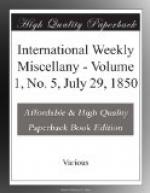Manifold are the ruinous phantasies which lead unhappy mortals to pandemonium. This one has a fancy for the turf, another patronizes the last imported choryphee. The turf is generally a settler—the stage is also a safe road to a safe settlement, and between a race-horse and a danseuse, we would not give a sixpence for choice. Now, as far as horse-flesh went, my grandfather was innocent; a pirouette or pas seul, barring an Irish jig, he never witnessed in his life—but he had discovered as good a method for settling a private gentleman. He had an inveterate fancy for electioneering. The man who would reform state abuses, deserves well of his country; there is a great deal of patriotism in Ireland; in fact, it is, like linen, a staple article generally, but still the best pay-master is safe to win; and hence, my poor grandfather generally lost the race.
My father looked very suspiciously at the letters—one had his own armorial bearings displayed in red wax—and the formal direction was at a glance detected to be that of his aunt Catharine—Catharine’s missives were never agreeable—she had a rent charge on the property for a couple of thousands; and, like Moses and Son, her system was “quick returns,” and the interest was consequently expected to the day. For a few seconds my father hesitated, but he manfully broke the seal—muttering, audibly, “What can the old rattle-trap write about? Her interest-money is not due for another fortnight.” He threw his eyes hastily over the contents—his color heightened—and my aunt Catharine’s epistle was flung, and most unceremoniously, upon the ground—the hope that accompanied the act, being the reverse of a benediction.
“Is there anything wrong, dear James?” inquired my mother, in her usual quiet and timid tone.
“Wrong!” thundered my father; “Frank will read this spiritual production to you. Every line breathes a deep anxiety on old Kitty’s part for my soul’s welfare, earthly considerations being non-important. Read, Frank, and if you will not devoutly wish that the doting fool was at the dev—”
“Stop, my dear James.”
“Well-read, Frank, and say, when you hear the contents, whether you would be particularly sorry to learn that the old lady had, as sailors say, her hands well greased, and a fast hold upon the moon? Read, d——n it, man! there’s no trouble in deciphering my aunt Catharine’s penmanship. Hers is not what Tony Lumpkin complained of—a cursed cramp hand; all clear and unmistakable—the t’s accurately stroked across, and the i’s dotted to a nicety. Go on—read, man, read.”
I obeyed the order, and thus ran the missive, my honored father adding a running commentary at every important passage; shall place them in italics—
“‘MY DEAR NEPHEW,’”
“Oh, —— her affection!”
“’If, by a merciful dispensation, I shall be permitted to have a few spiritual minded friends to-morrow, at four o’clock, at dinner—’”




